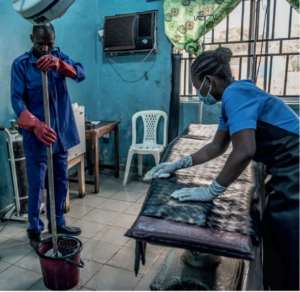Member Spotlight: Global Water 2020
Unveiling the Invisible Who Serve the Frontline of Healthcare
By Hayley Schram
They are responsible for protecting my safety and yours, by ensuring a safe and clean environment for all of us — patients, visitors, and staff alike — at healthcare facilities worldwide. Yet they are poorly paid; often lack sufficient training, supplies, and personal protective equipment (PPE); they are at continual risk of getting sick; and many experience stigma from patients, staff, and in their communities.

Hospital attendants sanitizing mattresses in a hospital in Mali. Photo by UNICEF.
The men — and mostly women — who do the physically exhausting, thankless, and sometimes dangerous work of scrubbing down disease-ridden healthcare facilities are rarely seen as vital participants on the frontlines of healthcare. Yet properly cleaning and disinfecting frequently contaminated surfaces — from bed rails and buckets, to doorknobs and labor and delivery rooms — their sweeping, dusting and mopping are essential in establishing a safe healthcare environment. The COVID-19 pandemic should spotlight the significance of their role to prevent the transmission of the virus as well as other infectious diseases. Yet their role, often thought of as tangential, if thought of at all, rarely takes into account their contributions, needs, and experiences.
Disinfection is key to prevention, and cleaning has been proven to remove over 90% of microorganisms and germs from surfaces, if done properly. But their jobs are made even tougher when 45 percent of healthcare facilities in the Least Developed Countries lack basic water services, 21 percent have no sanitation services, and 73 percent do not have basic healthcare waste management services, creating conditions that make it impossible for cleaners to effectively do their jobs.
Cleaners also often lack formal training in essential Infection Prevention and Control (IPC) measures and proper hand hygiene; both essential to maintain safety in the hundreds of thousands of healthcare facilities around the world. A needs assessment study conducted in 56 healthcare facilities throughout Bangladesh, India, The Gambia, and Zanzibar found that on average, less than a third of these facilities delivered formal training to their cleaning staff. Training provides cleaning staff with the knowledge to prevent healthcare acquired infections (HAIs) and has been linked to improve staff motivation and performance.
High-income countries are not immune to this issue. A study out of Cornell University found that in some hospitals in the United States, the job of cleaning is outsourced, which can lead to “increasing the likelihood that these workers are under-rewarded, undertrained, and detached from the organization and the rest of the care team.” As a result, this study found that the outsourcing of cleaners is related to the increased incidence of health-care associated infections (HAIs).

Two cleaners disinfecting the floor and a mattress at a health clinic. Photo by UNICEF.
The need to recognize and empower these forgotten public servants in high- low- and middle- income countries is more urgent than ever. As noted London School of Hygiene and Tropical Medicine professor and advocate for cleaners Wendy Graham,(also famous for presenting a mop to WHO Director General Tedros), concluded in a recent paper, “There is a clear need to empower these forgotten members of the healthcare workforce through raising awareness among key stakeholders, strengthening cleaners’ knowledge and practice, and tackling the institutional bottlenecks which often neglect the poor state of hygiene and the infection related consequences, and thus this cadre.”
Lillian Small, CEO of the Building Services Contractors Association of New Zealand (BSCNZ), created Thank Your Cleaner Day in 2015, in what has become an annual dedication to remind cleaners they are valued and appreciated every October 21. Now stakeholders, researchers, advocates, and organizations have to come together to expand appreciation with 12 proposed actions to elevate cleaners in the critical healthcare setting. These ideas range from training, budgets, and supportive supervision to community engagement, incentives and encouraging a culture of hygiene and safety.
We all have something at stake here. In a connected world consumed by COVID-19, a safe healthcare environment is essential to protect all of us. Improving the status of cleaners will provide a safer and a more dignified healthcare experience for patients, visitors, and staff, including the cleaners themselves.
About the Author:
Hayley Schram, MS, focused on cleaners and their role in establishing and maintaining environmental health conditions in Malawi while at The Water Institute at UNC, and is a research assistant at Global Water 2020.